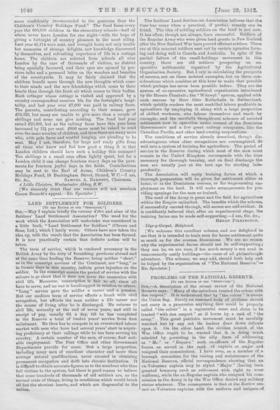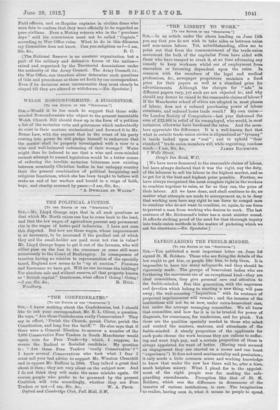PROBLEMS OF THE NATIONAL RESERVE.
[TO THE EDITOR OP THE " SPICTATOR.1
Sur,—A description of the recent review of the National Reserve says : "Many of the onlookers treated the colour with due respect." It is understood that by "the colour" is meant the Union flag. Surely an unarmed body of civilians should not carry in a procession anything that could be properly called "time colour" in a regimental sense and claim to be treated "with due respect" as if borne by a unit of "the army." This great patriotic movement must be carefully watched lest by any act its leaders draw down ridicule upon it. On the other hand the civilian branch of the War Office ought to be warned that it is doing .much mischief by persisting in the silly form of addressing as" Mr." or " Esquire " such ex-officers of the Regular forces as served in the rank of captain or major and resigned their commissions. I have seen, as a member of a borough committee for the raising and maintenance of the National Reserve, official correspondence showing that an ex-Volunteer captain may be styled " Major " (having been granted honorary rank on retirement with right to wear uniform), while the ex-Regular captain who resigned his com- mission in the Army is by the War Office denied any military status whatever. The consequence is that at the Review one saw ex-Volunteer captains with the uniform and insignia of Field officers, and ex-Regular captains in civilian dress who were fain to confess that they were officially to be regarded as pure civilians. Even a Mutiny veteran who in the "purchase days" sold his commission must not be called " Captain " according to War Office rules. What to do in this dilemma my Committee does not know. Can you enlighten us P—I am, [The National Reserve is no amateur organization but a part of the military and defensive forces of the nation— raised and organized by the Territorial Associations under the authority of the Army Council. The Army Council, i.e., the War Office, can therefore alone determine such questions of title and precedence as those set forth by our correspondent. Even if its decisions seem unreasonable they must clearly be obeyed till they are altered or withdrawn.—En. Spectator.]























































 Previous page
Previous page